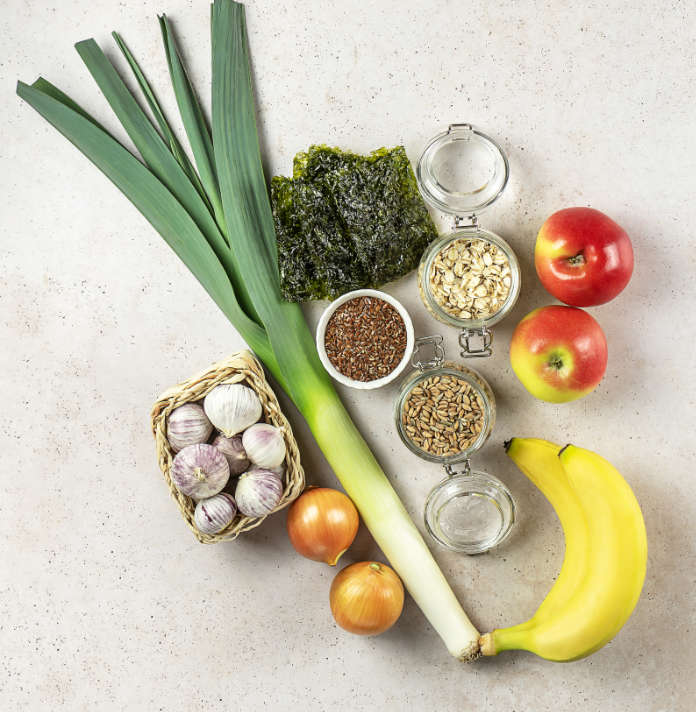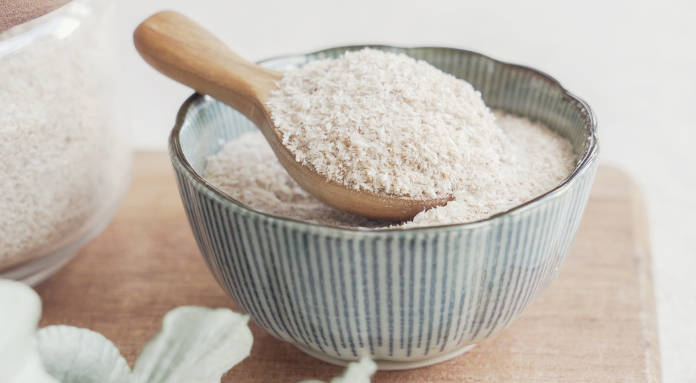Prebiotic supplements help increase the growth of good bacteria in the gut. They contain fibre that ferments to provide food for bacteria. They work hand in hand with probiotic supplements, allowing them to feed. This helps increase the number of helpful bacteria in the gut. An imbalance of bacteria in the gut is linked to symptoms like bloating and gas, and can be cause for concern with issues such as Irritable Bowel Syndrome (IBS).
What are prebiotics?
Prebiotics are plant fibres that the body can’t digest. Instead, the good bacteria in the gut eat the fibre which helps them to grow and thrive. This helps balance the microbiome of the gut and is linked to benefiting a number of functions around the body.
Prebiotics have several benefits. As well as helping to keep the gut lining cells happy, they help the body absorb calcium. They’re also able to ferment foods faster to spend less time in your digestive system – helping to avoid constipation. A healthier digestive system is important for the body to function properly. If the digestive system isn’t working well, symptoms may arise and cause discomfort for the individual. Prebiotics aid in the absorption of several nutrients and minerals, as well as helping to relieve constipation and tackle obesity.

Prebiotics are found to naturally occur in many different foods, mostly in whole grains, fruit and vegetables. These include:
- Apples
- Bananas
- Garlic
- Oats
- Onions
- Tomatoes
- Soybeans
There are also foods that are ‘fortified with’ added prebiotics, such as baby formula, bread and cereal.
Some experts say you should aim to incorporate into your diet, around five grams of prebiotics a day. However, too much of it can lead to uncomfortable symptoms like bloating. Prebiotic supplements can help individuals consume prebiotics if they have an imbalance that isn’t resolved with diet, or if they have allergies making them deficient in some foods.
What are prebiotic supplements?

Providing food for the bacteria to feed on, prebiotics work with probiotics to maintain a healthy gut balance.
Aside from naturally occurring in some foods, you can consume prebiotics through supplement form. They can be taken regularly to increase the growth of good gut bacteria by containing fermentable fibre and acting as food. Unlike probiotic supplements, they do not contain live bacteria, but they are unaffected by the gut acid and are able to reach the gut.
Due to their stability against acid, heat and have long-term shelf life, prebiotics can be added to any food or drink without altering the effectiveness. They can come in several forms such as pastilles, capsules and soluble powders. Taking these supplements may cause side effects like bloating, gas and discomfort; it is important to stick with recommended doses, but they are generally safe.
The best prebiotic supplements

Although incorporating probiotics from natural foods would be best for your gut health, supplements are an easy way to balance the microbiome and help encourage a healthier immune system. The best source of prebiotic supplements are based on individual necessities – there’s a variety to choose from. It’s important to know how to choose a prebiotic supplement, from daily forms to soluble fibre, with a number of benefits for each.
For daily use
Bimuno daily is a taste-free, soluble powder ideal for everyday use. It can be taken any time in the day by adding to hot or cold drinks, or sprinkling over food. It’s easy to incorporate into your daily routine. These supplements are proven to work in just 7 days and are suitable for vegetarians. Not suitable for vegans as they do contain milk.
One sachet a day is recommended (sachet = 3.65g). If you have a sensitive stomach, take half a sachet a day for 7 – 10 days until well tolerated, then increase to 1 sachet.
For sensitive stomachs
Bimuno prebiotic pastilles are an ideal supplement for sensitive stomachs. Proven to work in just 7 days, they are designed to support a healthy gut environment and increase levels of good bacteria.
They can be taken at any time of the day but ideally take two pastilles per day at the same time. These supplements are suitable children over the age of 4. Suitable for vegetarians but not vegans – contains milk.
For vegans
Healthspan’s Easyfibre Inulin is a natural prebiotic soluble fibre which helps to maintain a healthy gut and digestive system. Easyfibre can help reduce bloating and constipation by feeding the helpful bacteria in the gut. Inulin is a starchy substance that is found in chicory root- a natural prebiotic – making Easyfibre 100% natural.
You can add Easyfibre to a variety of drinks, including smoothies, or sprinkle over your cereal and porridge in the morning. It can also be used as a fat replacement and binding agent in baking. It provides a healthy way to sweeten food and drinks – as it’s 10% as sweet as sugar.
Plant-based
Choosing a prebiotic supplement that is plant-based is suitable for individuals with allergies and dietary requirements. Terranova Microflora Complex utilises the holistic innovation developed by Terranova by using whole, pure, phyto-rich foods and botanicals that are fresh freeze-dried. Each of their ingredients is chosen to fulfil specific functions, including providing synergistic enzymes and increasing the product’s overall nutrition value. Fresh freeze-drying has been researched and shown to retain and preserve the plant’s nutritional value. It is suitable for vegetarians and vegans.
Take one capsule daily with a meal and keep in the fridge after opening.
Frequently asked questions
Are prebiotics better than probiotics?
There isn’t a better source of supplement. Probiotics and prebiotics work together to help maintain a healthy gut. Probiotics feed on prebiotics to increase the number of good bacteria in the gut which helps to maintain a healthy balance in the microbiome.
What is the best time to take prebiotic supplements?
It is recommended to take prebiotic supplements with a glass of water and with a meal. Prebiotics work best with consistency, so try and take them regularly and at the same time each day.
You may be interested in…
This article may include affiliate links to products and services where we may receive a small fee to support the running of this site if you make a purchase or is a sponsored article from one of our select editorial partners providing valuable advice and information to our readers.







































































